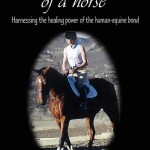
While equine therapy has many fans and many purported benefits, is it possible that this alternative form of therapy can be used to improve sports performance?
Looking to a “head guy” to help with the much sought after perfect golf shot, basketball game, or even ski run is nothing new. These mental specialists have only recently donned their breeches and boots and strode into the equine competition arena. As they have, psych strategies that have long been popular in other sports have made their way onto the back of a horse. Stress reduction strategies, such as progressive muscle relaxation, deep breathing, and cognitive rehearsal, have been among these. Now, even popular riders, such as Jane Savoie (www.janesavoie.com), employ the use of visualization techniques to cement the perfect ride.
Yet with the emergence of sports psychology in the horse world, can our horses actually help us to improve our performance, and possibly ride them better?
To answer this question, we must first understand that typical sports psychology methods approach the performance improvement problem from a solution focused perspective. While stress reduction and visualization have been proven quite effective, they are not so much concerned with the cause of the problem as they are with providing an effective and practical cure. However, equine facilitated psychotherapy looks at problems through a different lens. Or at least our horses do. Because horses communicate primarily through physiological responses, they also respond to what is happening on a physiological level with humans. Within this often subconscious matrix of emotions lies the root of the problem, and in the case of sports psychology, the barrier to that perfect ride. For example, a rider who struggles with nerves before entering the ring might be taught by a sports psychologist to find a quiet place, breathe deeply and visualize safely executing that great dressage test, hunter round, or jumper course.
But in equine therapy, the horse might uncover something different. Witnessing the horse’s natural response to the rider stricken with a case of nerves would tell him why he is nervous in the first place. Whatever the underlying reason for the rider’s anxiety, once he is made aware of it — through the horse’s response — he is naturally in a much better position to rectify it, and enjoy the ride as he does!